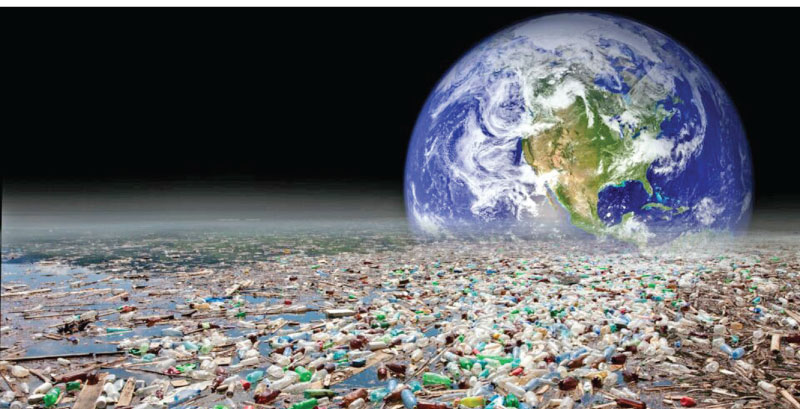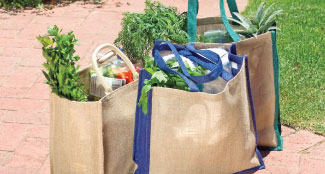
It could be a coincidence that just one intervening day separates Poson Poya Day and World Environment Day (WED), which falls tomorrow, June 5. It is chronicled that Arahat Mahinda, who delivered the sublime message of the Buddha Dhamma to King Devanampiyatissa tested the King on his knowledge of the environment. The King apparently passed this ‘test’ with aplomb, whereby Arahat Mahinda Thera held a Dhamma Discourse with the King and his retinue. Of course, the King also refrained from hunting the deer that he was chasing after, having learned from the Arahat Mahinda the value of all Life on Earth.
Indeed, Sri Lankans have had a close affinity with the environment for thousands of years, with the country now known as a prime Biodiversity hotspot with many endemic flora and fauna species. The forest cover has dwindled over the centuries, but Sri Lanka has still fared much better than most other countries in this regard. It has an unusually high number of national parks for a small island. The Environment is a part of the school curricula from the primary grades and people generally try to protect the environment as much as they can. But one problem will not go away easily in Sri Lanka or elsewhere – the problem posed by plastic pollution, which is exactly the theme of this year’s WED.
The WED is the biggest international day for the environment, led by the United Nations Environment Programme (UNEP), and held annually since 1973. Thus this year, the WED marks 50 years. It has grown to be the largest global platform for environmental outreach, celebrated by millions of people across the world.
Visible threat
WED 2023 is hosted by Côte d’Ivoire in Africa (formerly known as Ivory Coast) and supported by the Netherlands and the theme will focus on solutions to plastic pollution under the campaign and Twitter hashtag #BeatPlasticPollution. It is a reminder that people’s actions on plastic pollution matters. The steps Governments, businesses and individuals are taking to tackle plastic pollution are the consequence of this action.
Plastic is among the most produced materials today. Plastic products are cheap, easy to manufacture and form to desired shape. They are also robust enough to meet requirements for numerous applications. All these advantageous properties enabled plastic materials to become one of the biggest challenges of our times.
“The scourge of plastic pollution is a visible threat that impacts every community around the world,” said Jean-Luc Assi, Côte d’Ivoire’s Minister for the Environment and Sustainable Development. “As host of WED 2023, we welcome all sectors, from Governments and businesses to civil society, to come together to find and champion solutions.”
Côte d’Ivoire has banned the use of plastic bags since 2014, supporting a shift to reusable packaging. The country’s largest city, Abidjan, has also become a hub for start-ups looking to beat plastic pollution.
Ambitious action
This year’s WED will be supported by the Government of the Netherlands, which is one of the countries taking ambitious action along the plastic lifecycle. It is a signatory of the New Plastics Economy Global Commitment and a member of the Global Partnership on Plastic Pollution and Marine Litter. It is also a member of the High Ambition Coalition calling for a strong and ambitious international legally binding instrument to combat plastic pollution.
“Plastic pollution and its detrimental impacts on health, the economy and the environment cannot be ignored. Urgent action is required. At the same time, we need true, effective and robust solutions,” said Vivianne Heijnen, Netherlands’ Minister for the Environment. “As part of several policies aimed at plastics, The Netherlands and the European community at large are fully committed to reduce the production and consumption of single-use plastic, which can and must be replaced with durable and sustainable alternatives.”
A Resolution was adopted in 2022 at the United Nations Environment Assembly to develop a legally binding instrument on plastic pollution, including in the marine environment, with the ambition to complete the negotiations by end 2024. The first meeting of the Intergovernmental Negotiating Committee (INC-1) was held in Uruguay in December and the second meeting was expected to be held in Paris. The instrument is to be based on a comprehensive approach that addresses the full life cycle of plastic.
According to UN statistics, more than 400 million tonnes of plastic is produced every year worldwide, half of which is designed to be used only once. Of that, less than 10 percent is recycled. An estimated 19-23 million tonnes end up in lakes, rivers and seas annually. Microplastics – tiny plastic particles up to 5 mm in diameter – find their way into food, water and air. Discarded or burnt single-use plastic harms human health and biodiversity and pollutes every ecosystem from mountain tops to the ocean floor.
Potential damage
When exposed to environmental conditions such as solar irradiation and abrasion plastic materials slowly break down releasing micro- and nano-plastic particles. Micro- and nano-plastic has been found in tap water globally, as well as in soil and even human blood. The hazard of this new micro- and nano-pollutants is not yet well understood but can potentially have significant consequences to our health and well-being. Our current water treatment and processing infrastructure is not designed to deal with this new type of pollutant. The X-Press Pearl incident showed the damage that can be done to the marine environment through microplastics and plastic nurdles that can spill over from stricken ships.
 We live in a consumer-driven, throwaway society; more than half the plastic ever produced has been in the past fifteen years (UNEP statistics). Nearly half the plastic produced is used just once and thrown away. This ‘single-use plastic’ impacts our rivers, land, and oceans. As a non-biodegradable material, it breaks down into smaller particles (micro-plastics), which are eaten by small marine organisms, entering the food chain. Single use plastic packaging is still abundant and images of plastic packaging being collected from our rivers and oceans are commonplace. There is outcry at the damage done to our flora and fauna because of microplastics, yet more and more virgin plastic is produced. The Global recycling infrastructure is overwhelmed.
We live in a consumer-driven, throwaway society; more than half the plastic ever produced has been in the past fifteen years (UNEP statistics). Nearly half the plastic produced is used just once and thrown away. This ‘single-use plastic’ impacts our rivers, land, and oceans. As a non-biodegradable material, it breaks down into smaller particles (micro-plastics), which are eaten by small marine organisms, entering the food chain. Single use plastic packaging is still abundant and images of plastic packaging being collected from our rivers and oceans are commonplace. There is outcry at the damage done to our flora and fauna because of microplastics, yet more and more virgin plastic is produced. The Global recycling infrastructure is overwhelmed.
Governments need to step up and make bold decisions to push extended producer responsibility and create a circular economy which reduces and reuses plastic more sustainably. But it is important to note that plastic packaging is not the sole problem here, the issue comes when the consumer takes that packaging home and doesn’t know if or how it can be recycled. There should be better labeling on all packages, clearer messaging and simpler materials on the marketplace to make recycling easier.
It’s easy to look at the waste management practices of the major cities and blame them for not providing the infrastructure, but without robust policies in place and behaviour changes from the consumer, the problem becomes harder to address. There is a long way to go when it comes to addressing plastic pollution at a global level.
Reusable bag, a better alternative
In fact, changing consumer behaviour is the best option because it has the potential to stop the proliferation of plastics in the first place. Millions of Sili-Sili or plastic bags are issued to customers by supermarkets and shops in Sri Lanka (and elsewhere) every day, but this can be stopped simply by taking a reusable bag to the shop. Granted, these new Sili-Sili bags are supposed to be biodegradable, but even that is a rather slow process. A reusable bag is a much better alternative.
Again, it is better to stop buying soft drinks in PET bottles – the companies should give more prominence to glass bottles, which are automatically recycled as the customer has to hand in the old used bottle to get a new one. And the bottled water industry, which uses plastic bottles, is one of the worst offenders in terms of the damage caused to the environment. Recent studies suggest that around two litres of water are used to produce a 1L plastic bottle, even before the contents are poured in. In Sri Lanka, a supermarket chain has installed a few machines which can actually recycle used water bottles in return for supermarket points, which is a worthy initiative that should be rolled out islandwide.
Eco-friendly moves
Consumers should always try packaging and other materials that are better for the environment than plastic. Sri Lanka has banned the use of many single use plastics, but one can still find many plastic items in supermarkets.
Given a choice between plastic, wooden and paper spoons for a takeaway meal, the latter two are the best option. It is heartening to note that many companies are now opting for paper packaging, cups and utensils.
Plastics are very versatile and it might not be possible to replace them entirely within even the next decade. The plastics manufacturers also have the responsibility of making their products more recyclable and degradable at the end of their useful ‘lífe’. If that is not done with the urgency it deserves, all life on Earth will suffer, adding to the misery caused by Climate Change and Biodiversity Loss. And remember, we do not have a Planet B, so we have to protect the Earth right now.
Solutions to plastic pollution
More than 400 million tonnes of plastic is produced every year worldwide, half of which is designed to be used only once. Of that, less than 10 percent is recycled.
 An estimated 19-23 million tonnes end up in lakes, rivers and seas annually. That is approximately the weight of 2,200 Eiffel Towers all together.
An estimated 19-23 million tonnes end up in lakes, rivers and seas annually. That is approximately the weight of 2,200 Eiffel Towers all together.
Microplastics – tiny plastic particles up to 5 mm in diameter – find their way into food, water and air. It is estimated that each person on the planet consumes more than 50,000 plastic particles per year –and many more if inhalation is considered.
Discarded or burnt single-use plastic harms human health and biodiversity and pollutes every ecosystem from mountain tops to the ocean floor.
With available science and solutions to tackle the problem, governments, companies and other stakeholders must scale up and speed actions to solve this crisis.
This underscores the importance of this World Environment Day in mobilizing transformative action from every corner of the world.
- UN.org
